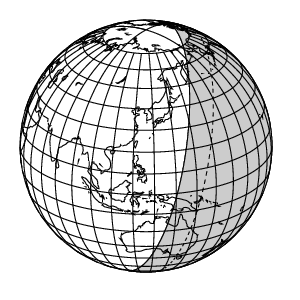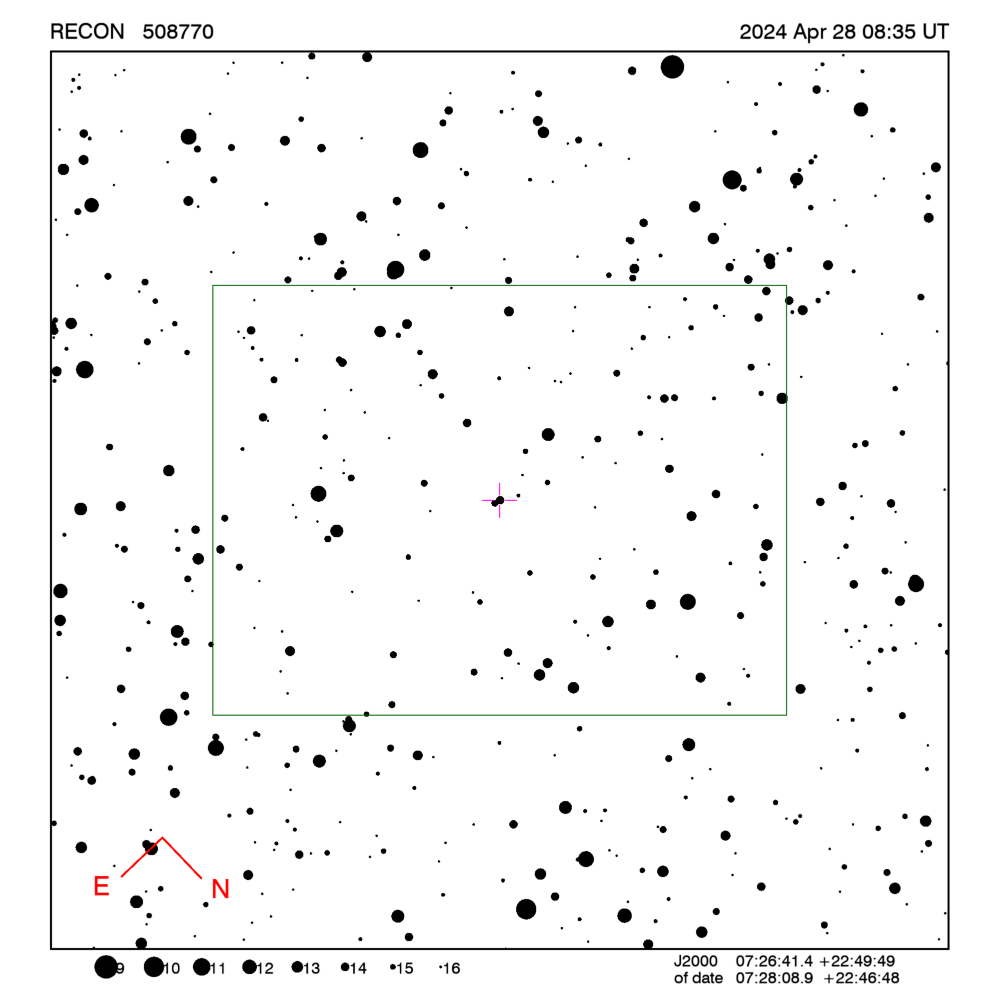RECON: TNO occultation with 508770
Event between (508770) 95WY2 and star GA1120:02789632
with event index number of 2103066
Geocentric closest approach at 2024/04/28 08:35:08 UTC
J2000 position of star is 07:26:41.4 +22:49:49
Equinox of date position of star is 07:28:08.1 +22:46:49
Stellar brightness G=16.7,
use SENSEUP=128 with the MallinCam and and exposure
time of 2 seconds with the QHY174 camera.
Star is 159 degrees from the moon.
Moon is 82% illuminated.
Apparent brightness V=23.7
 Object is 44.4 AU from the Sun
and 44.8 AU from the Earth.
Object is 44.4 AU from the Sun
and 44.8 AU from the Earth.
Apparent velocity is 13.4
km/sec on the sky relative to the star, or,
1.5 arcsec/hr.
The 1-sigma error in the time of the event is 1780 seconds.
The 1-sigma cross-track error in the shadow position is
4024 km.
The object has an absolute magnitude Hv=7.1
Diameter=229.1 km assuming a 5% albedo -- 17.4 sec chord
Diameter=93.5 km assuming a 30% albedo -- 7.1 sec chord
Dynamical classification is CLASSICAL
Star training set for 508770, (2024/04/28 08:35UT)
Object RA Dec mag sep mel
Pollux 07:46:48.2 +27:57:56 1.1 6.68 156
58 Gem 07:24:55.7 +22:53:47 6.0 0.75 160
PPM 097540 07:29:35.3 +22:36:01 9.0 0.38 159
PPM 097518 07:28:42.8 +22:56:05 11.1 0.20 159
508770 07:28:08.9 +22:46:48 16.7 159
Positions are for equinox of date

Azimuth is measured in degrees eastward from north.
North is at an azimuth of 0, due East is at an azimuth
of 90 degrees, due South is 180, and due West is 270.
Do not use the listing below for the RECON CPC 1100 telescopes.
This is provided for other non-team facilities.
Star training set for 508770, (2024/04/28 08:35UT)
Object RA Dec mag sep mel
Pollux 07:45:17.9 +28:01:33 1.1 6.68 156
58 Gem 07:23:28.1 +22:56:42 6.0 0.75 160
PPM 097540 07:28:08.0 +22:39:06 9.0 0.38 159
PPM 097518 07:27:15.2 +22:59:07 11.1 0.20 159
508770 07:26:41.4 +22:49:49 16.7 159
Positions are for J2000
Event circumstances last updated at 2024/02/12 04:20:58 UT
Marc W. Buie,
Southwest Research Institute
RECON
 Object is 44.4 AU from the Sun
and 44.8 AU from the Earth.
Object is 44.4 AU from the Sun
and 44.8 AU from the Earth.
